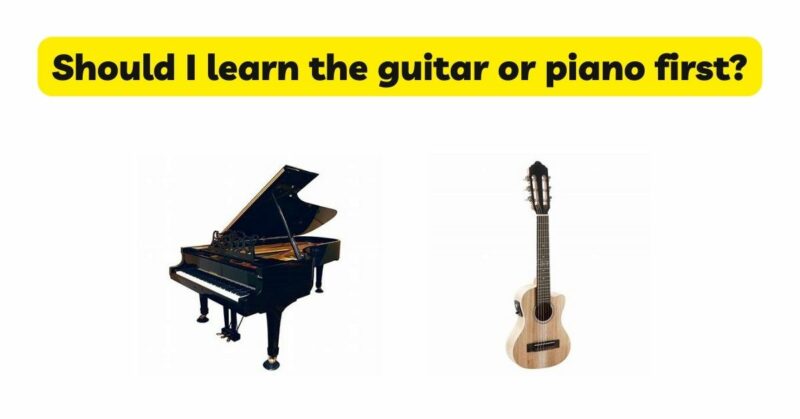Embarking on a musical journey is an exciting endeavor that offers opportunities for self-expression, creativity, and personal growth. For aspiring musicians, one of the critical decisions is whether to learn the guitar or piano first. Both instruments have their unique appeal and benefits. In this article, we will delve into the considerations, advantages, and factors to help individuals make an informed choice between learning the guitar or piano as their first instrument. By understanding the distinct characteristics, personal preferences, and long-term musical goals, individuals can confidently embark on their chosen path, whether it be learning the guitar or piano first.
- Musical Preference and Personal Interest: One of the primary factors to consider when choosing between the guitar and piano is personal preference and musical interest. Reflect on the genres and styles of music that resonate with you the most. Consider the sound, timbre, and versatility of each instrument in relation to your musical preferences. Choosing an instrument that aligns with your personal interest ensures a deeper sense of connection and motivation throughout your musical journey.
- Learning Curve and Initial Progress: Another factor to consider is the learning curve and initial progress on each instrument. The guitar is generally considered more accessible for beginners due to its simplicity in terms of learning basic chords and strumming patterns. With a few fundamental chords, beginners can start playing simple songs relatively quickly. On the other hand, the piano requires learning music notation, hand coordination, and finger independence, which may require more time and effort before playing recognizable melodies. Assess your patience and willingness to invest time in the initial stages of learning each instrument.
- Music Theory and Foundation: The piano offers a comprehensive foundation in music theory due to its polyphonic nature, linear arrangement of keys, and visual representation of musical concepts. Learning piano provides an intuitive understanding of scales, chords, harmonies, and melody, which can be applied to any instrument. By starting with the piano, you lay a strong foundation in music theory that can significantly aid your musical development and learning of other instruments, including the guitar.
- Technical Considerations: The guitar and piano have different technical requirements that may influence your decision. The guitar demands finger dexterity, strumming techniques, and fretting, which may be challenging for individuals with smaller hands or less finger strength. Conversely, the piano requires hand coordination, finger independence, and an understanding of playing dynamics. Consider your physical attributes and whether they align more naturally with one instrument over the other.
- Versatility and Musical Expression: Both the guitar and piano offer unique opportunities for musical expression, but their versatility differs. The guitar is often associated with accompaniment, melody, and a wide range of genres, from classical to rock, pop, and folk. It allows for chord-based playing, fingerpicking, and soloing. The piano, with its polyphonic capabilities, lends itself well to harmonies, complex arrangements, and exploring classical, jazz, and contemporary music. Consider the genres and styles of music you aspire to play and the level of versatility each instrument offers in achieving your musical goals.
- Long-Term Goals and Musical Aspirations: When deciding between the guitar and piano as your first instrument, it is essential to consider your long-term musical goals and aspirations. If you have a particular musical genre or style in mind, research the instrument commonly associated with it and consider starting with that instrument. Additionally, think about your desire to perform solo or collaborate with other musicians. This can help determine whether the guitar or piano aligns better with your aspirations and potential avenues for musical growth.
- Accessibility and Resources: Consider the accessibility of the instrument and the availability of resources for learning. The guitar is a portable instrument that can be carried around and played in various settings, making it easier to practice and learn in different environments. There are also abundant online resources, tutorials, and learning platforms dedicated to guitar education. The piano, while less portable, is often available in public spaces, schools, and music institutions. Additionally, access to piano teachers and instructional materials may vary depending on your location and resources.
- Follow Your Heart: Ultimately, the decision between learning the guitar or piano first should be guided by your heart and passion for music. Follow your instinct and choose the instrument that excites you the most. Remember that learning an instrument is a lifelong journey, and there is no right or wrong choice. If you have a strong desire to play a specific instrument, that passion will drive you to overcome challenges, persevere through the learning process, and ultimately achieve your musical goals.
Conclusion: In conclusion, the decision to learn the guitar or piano first is a personal one, influenced by factors such as musical preference, learning curve, music theory foundation, technical considerations, versatility, long-term goals, accessibility, and resources. Assess your own interests, musical aspirations, physical attributes, and learning preferences. Consider the unique benefits and challenges each instrument offers. Ultimately, follow your heart and choose the instrument that resonates with you the most. Remember that the journey of learning an instrument is a rewarding one, and regardless of which instrument you choose to learn first, it is the passion, dedication, and joy in playing that will lead to fulfilling musical experiences.


